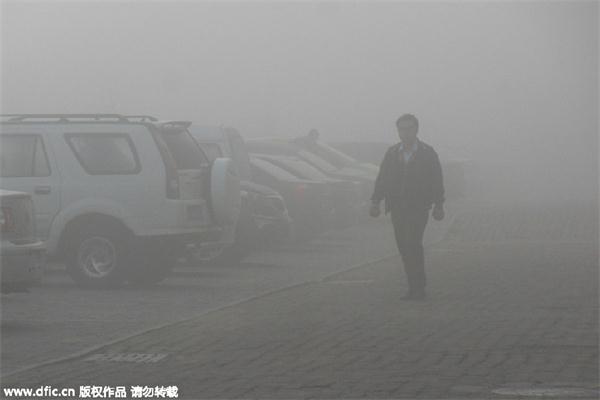Handling of small things tests governing capability
Updated: 2015-10-21 08:03
(China Daily)
|
||||||||
 |
|
A man walks in the haze in Weihai city, Shandong province, Oct 16. [Photo/IC] |
It sounds unbelievable, but it's true.
A country that can accomplish many great things, such as hosting the most spectacular Olympic Games and building the world's largest high-speed railway network has failed to solve the problem of disposing of crop stalks in an environmentally friendly manner.
It is 16 years since the burning of crop residue was first banned nationwide. But during the beginning of October until the middle of the month, more than 800 spots where crop stalks were being burned were spotted in 20 provinces, autonomous regions and municipalities.
The smog that shrouded many major cities was said to be related to the burning of crop stalks.
It is common sense that crop residue should be a resource for feed for cattle, fuel for cooking, organic fertilizer and even used to generate electricity. So why are rural villagers not encouraged to better utilize crop residue as a resource?
It is because it is too costly for villagers to utilize the crop stalks for aforementioned purposes except burning them down to organic fertilizer. And while it has been reported that some local governments do give subsidies for villagers to make the best use of crop stalks, the villagers find it easiest to burn them, especially as there is no cost involved.
It will take a lot of coordination and better organization for the relevant parties to persuade villagers that crop stalks can be made the best use to the benefit of both rural villagers and the environment.
Then why is this not happening?
Surely it is no more difficult than hosting the Olympic Games or building a high-speed rail line to get villagers to make better use of crop residue.
The efforts made for the accomplishment of big projects get local leaders enthusiastic as they lead to promotions or other benefits from higher authorities.
However, what truly reveal the governing capability of a government are such routine small things as the disposal of crop stalks in an efficient and environmentally friendly manner or the classification of garbage, both areas in which many local governments have done poorly.
With China becoming more developed and people's living standards continuing to improve, failure to tackle the many small things that greatly compromise the quality of people's lives will be consequential.
- Wide support seen for nationwide smoking ban
- Treat or cheat: Chinese media exposes queer therapies on gay people
- Farmland hot spots increase air pollution
- Mentally impaired earn their bread at Nanjing bakery
- China 'will never recklessly resort to the use of force'
- Chinese look yonder for luxury goods
Most Viewed
Editor's Picks

|

|

|

|

|

|
Today's Top News
Tu first Chinese to win Nobel Prize in Medicine
Huntsman says Sino-US relationship needs common goals
Xi pledges $2 billion to help developing countries
Young people from US look forward to Xi's state visit: Survey
US to accept more refugees than planned
Li calls on State-owned firms to tap more global markets
Apple's iOS App Store suffers first major attack
Japan enacts new security laws to overturn postwar pacifism
US Weekly

|

|















